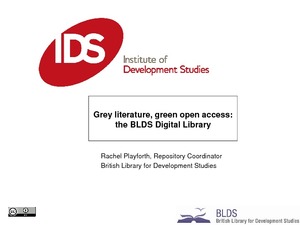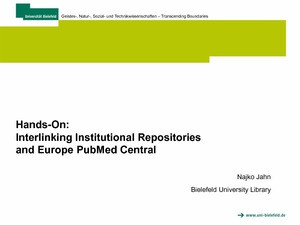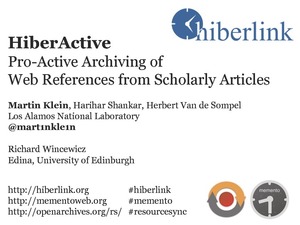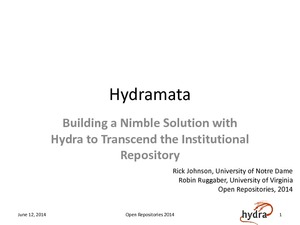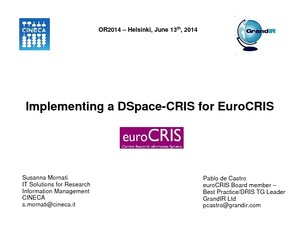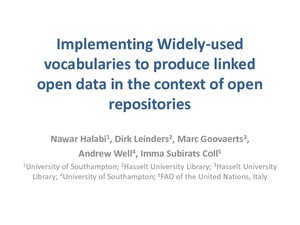Selaus nimekkeen mukaan kokoelmassa
Viitteet 74-93 / 218
-
Geo-enabling repositories - techniques, tools, and challenges
(10.06.2014)It is widely recognised that resources have an important spatial as well as temporal component that assist in both discovery and use. This has led to an increasing appreciation of the importance of ensuring that resources ... -
Getting Started with Islandora
(09.06.2014)Islandora is a digital asset management system that provides out-of-the-box repository solutions (Solution Packs) for a wide range of digital collections and research domains. Islandora combines the Drupal CMS and Fedora ... -
GIS in Digital Repositories
(09.06.2014)Geographic Information Systems (GIS) produce a plethora of spatially referenced data that are in high demand by the research community. Libraries’ ability to identify, deliver, and preserve such scientific data, however, ... -
Grey literature, green open access: the BLDS Digital Library
(10.06.2014)Grey literature is increasingly available online, but there are still problems with finding and using it. Although the primary function of institutional repositories has been to store and make accessible pre-publication ... -
Hacking User Experience in a Repository Service: ScholarSphere as a Case Study
(11.06.2014)User experience continues to be an under-explored area for repository services, even more than a decade into the production instances of many institutional repositories (IRs). Only a handful of articles, for example, are ... -
Hands-On: Interlinking Institutional Repositories and Europe PubMed Central
(12.06.2014)A growing number of research services allowing automated access to domain specific Open Access articles and research data. For life science literature, Europe PubMed Central provides web services that offer, among others, ... -
Handshake ecosystem for Educational Contents between Institutional Repository and OER based Repository
(10.06.2014)The National Institute of Informatics (NII) has led a Japanese institutional repository (IR) project since 2005 and, developed metadata harvesting system named IRDB from all over Japan. NII also defines metadata specific ... -
Heading for Open Science: Filling the Knowledge Gap
(10.06.2014)The FOSTER (Foster Open Science Training for European Research) project, funded by the European Commission, will facilitate a wide range of Open Science training – supplemented by a collection of learning and training ... -
HiberActive: Pro-Active Archiving of Web References from Scholarly Articles
(10.06.2014)References in scholarly communication have traditionally pointed to published articles or book chapters. However, today’s scholarly communication increasingly contains links to a wide range of web resources to support the ... -
HIMALDOC: A Tool for a Regional Open Repository on Sustainable Mountain Development Issues in the Hindu Kush Himalaya
(10.06.2014)HIMALDOC, based on Invenio software, has been developed by ICIMOD as a tool for the Hindu Kush Himalayan (HKH) regional repository on sustainable mountain development issues. The HKH region is the source of 10 large Asian ... -
How can we agree on some product agnostic repository function fundamentals?
(11.06.2014)While we at UCSD were working on adding Hydra to our locally developed (not Fedora) DAMS, it struck me that we got down to a few handfuls of necessary functions that were required to get the two systems to talk to each ... -
How to Hack the DSpace Community
(13.06.2014)Hacking open source code is one thing. But, how does one hack the DSpace community to: * get your code in * get your bug fixed * get your feature idea built This session will provide hints and tips on how to streamline ... -
How to take advantage of ORCID in institutional repositories
(09.06.2014)ORCID provides a means of uniquely and unambiguously identifying authors and contributors involved in the creation of materials in repositories. Worldwide, a number of universities are among the early adopters of ORCID and ... -
The Human Communication Science Virtual Lab (HCS vLab): A repository microclimate in a rapidly evolving research-ecosystem
(11.06.2014)The HCS vLab represents a new kind of data driven research collaboration environment built around a repository of human communication data, from research collections in a broad range of fields. The repository contains text, ... -
Hydra Europe
(10.06.2014)This poster will demonstrate the breadth of usage of the Hydra open repository solution within Europe, and highlight how the institutions using it have engaged with the Hydra community to establish their own repositories ... -
Hydra for Managers Workshop
(09.06.2014)The Hydra for Managers workshop will enable repository managers and curators of digital collections to learn about the Hydra Project, encompassing both the community and the technical development. Focusing on the community ... -
Hydramata: Building a Nimble Solution with Hydra to Transcend the Institutional Repository
(12.06.2014)We are all facing rapidly changing repository demands that call for maximizing flexibility and interoperability among a heterogeneous network of technologies, varied workflows and wide array of evolving formats that are ... -
Implementing a DSpace-CRIS for euroCRIS
(13.06.2014)DSpace-CRIS is a recently released research information management system that combines the agile Open Access content management provided by the DSpace repository platform with additional CERIF-compliant CRIS features ... -
Implementing RDF metadata in Hydra
(09.06.2014)This two-hour workshop will provide an overview of the current patterns for implementing RDF in Hydra repositories. Developers will have a hands-on opportunity to implement simple metadata models described using RDF. The ... -
Implementing Widely-used Vocabularies to Produce Linked Open Data in the Context of Open Repositories
(13.06.2014)The Food and Agriculture Organization (FAO) of the United Nations works to provide support to agricultural information communities to build and maintain open repositories that meet recommended metadata standards and ...


